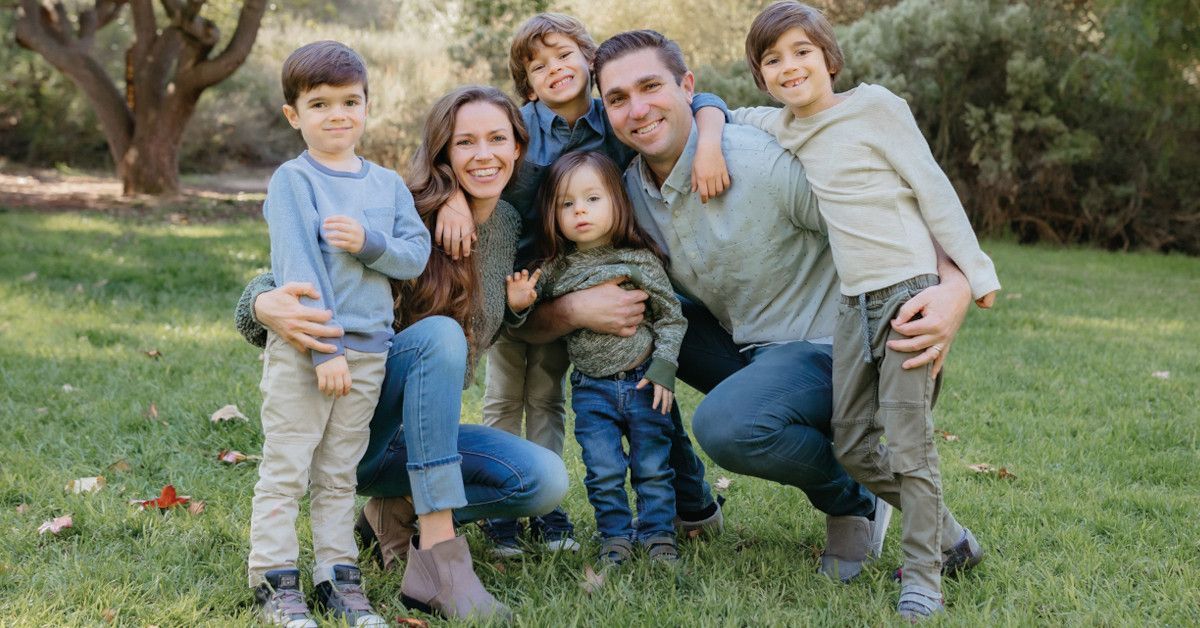Hope for Our Zebra
Alumni family takes on rare disease research to cure their child.
Story by:
Media contact:
Published Date
Story by:
Media contact:
Share This:
Article Content
This story was published in the Spring 2023 issue of UC San Diego Magazine.
There's an old saying in medicine when diagnosing patients: “When you hear hoof-beats, think horses, not zebras.” But our sweet baby boy, Tristan, is a zebra. He’s one of only 50 in the world. There are 20,000 genes and 3.2 billion nucleotides, and he was born with a random mutation in one single nucleotide. And that one mutation changes everything. Mutations in the KCNH1 gene cause profound intellectual disability and severe epilepsy. There are currently no treatments — but we’re trying to change that.
My husband, Kevin, and I met almost exactly 20 years ago as carefree undergraduates at UC San Diego. We loved our time there, and shortly after graduating, we married in 2007. As a young couple, we traveled around the world, completed our graduate studies and settled into our careers, me as a marriage and family therapist and Kevin as a high school social studies teacher. I had always wanted a big family with siblings close in age, and we were lucky to have three healthy little boys in three and a half years, all at UC San Diego hospitals. Our fourth and youngest son, Tristan, was 15 months old when he was diagnosed with a KCNH1 genetic mutation. The geneticist said this was the first case he had ever seen. He didn’t have any other information for us beyond an article he had printed out from the internet. So, even with a diagnosis, we were on our own to figure out what it meant.
I began to research everything I could find about KCNH1, and it was utterly devasting. Most kids with this mutation don’t progress beyond the developmental level of a toddler. They can’t self-feed or potty train, and the majority are nonverbal. They also suffer from hard-to-control epilepsy, gastrointestinal problems and sleep disturbance. Many are wheelchair users and dependent on feeding tubes. Tragically, many die from seizures or other complications.
I was completely crushed and overwhelmed envisioning my son's future. I wasn’t ready to accept this fate for Tristan. I knew the technology exists for gene therapies, and I wondered if we could create one for Tristan. I started emailing researchers, doctors and rare disease advocates all over the world. I learned that there are families who have raised millions of dollars to fund the development of treatments for their kids. If it could be done, I was determined to do it for Tristan.
We established the Cure KCNH1 Foundation in late 2021. In a little over a year, we have gathered a scientific team from around the world, coalesced the patient community and raised over $350,000 toward the development of treatments. In collaboration with academic partners, we are developing invaluable research tools such as cell lines, knock-in mouse models and other in vivo and in vitro models.
I learned that there are families who have raised millions of dollars to fund the development of treatments for their kids. If it could be done, I was determined to do it for Tristan.
We’re working on three translational medicine approaches. The first is to identify repurposed medications that can help correct the potassium channel dysfunction caused by the KCNH1 mutation. The second is to develop an antisense oligonucleotide therapy that can suppress the creation of toxic proteins. And our long-term approach is to create a gene-editing “cure” that can correct that one tiny nucleotide misspelling.
This work — developing precision treatments — is at the forefront of scientific progress in medicine, and it has applications far beyond the tiny KCNH1 community. Like some other rare diseases, KCNH1 has a direct link with cancer; the gene is over-expressed in 70% of cancerous tumors. It is our hope that the work we do for KCNH1 may offer insight into new treatments for devastating diseases that affect millions of Americans.
Kevin and I are doing everything we can to advance life-changing treatments for Tristan and the other KCNH1 kids. With the support of dedicated scientists and an amazing community, we have made it our life’s mission to find a cure. When your son is a zebra, you have no other choice.
Share This:
Stay in the Know
Keep up with all the latest from UC San Diego. Subscribe to the newsletter today.





